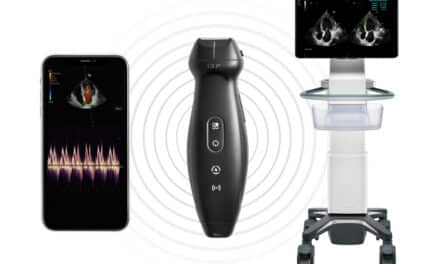Butterfly Network Inc, a digital health company transforming care with handheld, whole-body ultrasound, announces its position in a new study published in NEJM Evidence, which introduces a significant opportunity to democratize obstetric ultrasound.
The study, conducted from September 2018 through June 2021, recruited 4,695 pregnant volunteers in North Carolina and Zambia. The volunteers received blind ultrasound sweeps of the pregnant abdomen alongside standard fetal measurements, collected on both the commercial ultrasound machine and on Butterfly iQ, the company’s handheld, whole-body point-of-care ultrasound probe. Researchers trained a neural network to estimate gestational age from the sweeps.
Joni Price, MD, an assistant professor of obstetrics and gynecology at UNC who lives full time in Zambia and led study implementation recognizes the disruptive potential of Butterfly. “Armed with a pocket-sized Butterfly probe and a smartphone, a Zambian midwife with no prior training in sonography can assess gestational age as accurately as a certified sonographer using an expensive machine. This has the potential to revolutionize the delivery of obstetric care in settings like Zambia.”
Establishing accurate gestational age with ultrasound early in pregnancy is essential to delivering high-quality care. Yet, the high cost for equipment and the need for trained sonographers limits its use in low-resource settings.
Jeff Stringer, MD, associate director of UNC’s Institute for Global Health and Infectious Diseases came up with the idea for this project. “Ultrasound is like a stethoscope to the modern obstetrician. We use it all day, every day. These results foretell a future where all pregnant people—not just those who live in rich countries—can access the diagnostic benefits of obstetric ultrasound.” Dr. Stringer directs UNC’s Division of Global Women’s Health and is a professor of obstetrics and gynecology.
“Prior to this important research, access to low-cost imaging devices and the expertise to perform scans presented challenging hurdles to overcome in low-resource care settings,” says John Martin, MD, chief medical officer of Butterfly Network. “The results of this study offer hope to millions of mothers when it comes to determining risk and sequencing care. The findings also reinforce our belief that mid-level practitioners, when armed with the right tools, can meaningfully improve outcomes and advance the standard of care.”
Funded by the Bill and Melinda Gates Foundation, this research is part of the Fetal Age Machine Learning Initiative (FAMLI), an ongoing project that is developing technologies to expand obstetrical ultrasound access to low-income settings where cost and logistics have traditionally prevented its use.
Separate from this study, and through the support of a grant from the Bill & Melinda Gates Foundation, Butterfly recently announced that it will distribute 1,000 Butterfly iQ+ devices to healthcare workers in Sub-Saharan Africa, in part, to advance maternal and fetal health.






